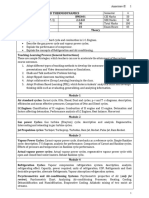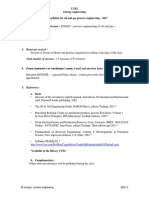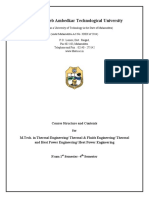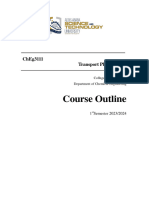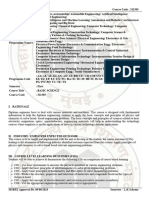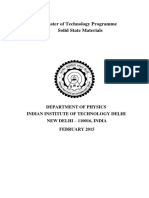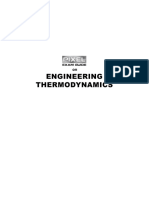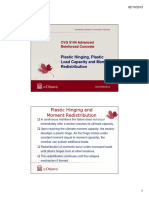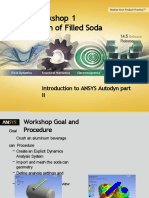Lesson Plan: Institute of Space Technology
Lesson Plan: Institute of Space Technology
Uploaded by
ShahZaib AnwarCopyright:
Available Formats
Lesson Plan: Institute of Space Technology
Lesson Plan: Institute of Space Technology
Uploaded by
ShahZaib AnwarOriginal Title
Copyright
Available Formats
Share this document
Did you find this document useful?
Is this content inappropriate?
Copyright:
Available Formats
Lesson Plan: Institute of Space Technology
Lesson Plan: Institute of Space Technology
Uploaded by
ShahZaib AnwarCopyright:
Available Formats
Doc # IST-F-32/04
Institute of Space Technology Date of Issue 08-May -2014
LP No: MECH-THDI-LP/01
Lesson Plan
Page# 1 of 3
DEPARTMENT & PROGRAM: BS Mechanical Engineering
COURSE CODE-COURSE NAME: 114301 Thermodynamics I CR: 3-0
COURSE DESCRIPTION:
Provides Essential Background and competence to the students to have a basic know how and analyzing of
thermodynamics fundamentals
PREREQUISITE: 117401 Applied Physics
CO-REQUISITE: Nil
TEXT AND MATERIALS:
Textbook:
1. Applied Thermodynamics for engineering Technologists by T. D. Eastop and A. McConkey
Reference Material:
1. Thermodynamics; An Engineering Approach by Yunus A. Cengel and Micheal A. Boles
2. Fundamentals of Thermodynamics by Sontag, Borgnakke and Van Wylen
RELEVANT PROGRAM LEARNING OUTCOMES:
The course is designed so that students will achieve the PLOs:
1. PLO-01: Engineering Knowledge: An ability to apply knowledge of mathematics, science and
engineering fundamentals and an engineering specialization to the solution of complex engineering
problems.
2. PLO-02: Problem Analysis: An ability to identify, formulate, research literature, and analyze
complex engineering problems reaching substantiated conclusions using first principles of
mathematics, natural sciences and engineering sciences.
COURSE LEARNING OUTCOMES:
Upon successful completion of the course, the student will be able to:
1. Describe the fundamentals of Thermodynamics and have its basic knowledge.
2. Use steam tables and interpret data for evaluating steam properties and solving thermodynamics
problems.
3. Analyze and explain various power cycles used in thermal systems.
PRACTICAL APPLICATIONS:
This course is a pre-requisite for all advanced engineering students and serves as a link between physics and
engineering subjects. Fundamentals concepts delivered in this course will be used in many applied courses
used in thermal system engineering and design. Students will be able to design thermal systems like power
plants, automobile engines, and rotodynamic machinery.
Doc # IST-F-32/04
Institute of Space Technology Date of Issue 08-May -2014
LP No: MECH-THDI-LP/01
Lesson Plan
Page# 2 of 3
LECTURE PLAN:
Instruction 60%
Discussion 15%
Exercises/Tutorial 25%
Module Topic Reference Week/Lecture
I Introduction to First Law of Thermodynamics
1.1 Heat, work and system
1.2 Working fluid and its states
1.3 Reversibility
Textbook I
1.4 Reversible Work 1-3
1.5 Conservation of energy
1.6 First law of thermodynamics
1.7 Non-flow equations
1.8 Steady flow equations
II Working Fluid
1.1 Liquid, vapour and gas Textbook I
4-5
1.2 Use of vapour table
1.3 Perfect gas
III Reversible and Irreversible Processes
3.1 Reversible non-flow processes
3.2 Reversible adiabatic non-flow
processes Textbook I
6-9
3.3 Polytropic process
3.4 Reversible flow processes
3.5 Irreversible processes
3.6 Non-steady flow processes
IV Second Law of Thermodynamics
4.1 Heat Engine
4.2 Entropy Textbook I
4.3 T-s diagram 10-13
4.4 Reversible processes on T-s diagram
4.5 Entropy and irreversibility
V Heat Engine Cycle
5.1 Carnot cycle
5.2 Absolute Temperature scale
5.3 Constant pressure cycle
Textbook I 14-16
5.4 Air standard cycle
5.5 Otto Cycle
5.6 Diesel cycle
5.7 Dual combustion cycle
5.8 Stirling & Ericsson cycle
Doc # IST-F-32/04
Institute of Space Technology Date of Issue 08-May -2014
LP No: MECH-THDI-LP/01
Lesson Plan
Page# 3 of 3
17
Final Examination
COURSE TARGETS:
Learning PLO
Module CLO Teaching
Assessment Methodology Domain with
No. No. Methodology
Level
Lecture +
I, II, III 1 Assignments/Quizzes/OHTs/Final C-1 PLO-1
Discussion
Lecture +
IV 2 Assignments/Quizzes/OHTs/Final C-3 PLO-2
Discussion
Lecture + Assignments/Quizzes/OHTs/Final/Projec
V 3 C-4 PLO-2
Discussion t Report
ASSESMENT:
The course will include on mid-term during the semester in addition assignments at the end of each module
may be set. One mini-project per individual will also be included to enhance the hands-on abilities of the
students A comprehensive final examination over the all module, of at least 3 hours duration, will be set at
the end of the course. Evaluation will be competency based and student grades will be based on the following
factors.
Assignments 05-10%
Quizzes 10-15%
OHT Exam 20-25%
Final Exam 45-50%
Project 10-15%
Total 100%
Written Name with sign Mr. Hafiz Muhammad Suleman
By Date
Name with sign Mr. Muhammad Shaban
Reviewed By
Date
Name with sign Dr. Asif Israr
Approved By
Date
You might also like
- Heat and Mass Transfer Final ProjectDocument4 pagesHeat and Mass Transfer Final ProjectChaudhary Jabbar JavedNo ratings yet
- Lesson Plan Thermodynamics IIDocument4 pagesLesson Plan Thermodynamics IIShahZaib AnwarNo ratings yet
- First Day Material ME495Document4 pagesFirst Day Material ME495Abo AliNo ratings yet
- Lesson Plan: Institute of Space TechnologyDocument3 pagesLesson Plan: Institute of Space TechnologyShahZaib AnwarNo ratings yet
- Birla Institute of Technology and Science, Pilani Pilani Campus Instruction DivisionDocument6 pagesBirla Institute of Technology and Science, Pilani Pilani Campus Instruction DivisionSijo VMNo ratings yet
- Third Semester1571374736Document15 pagesThird Semester1571374736miraazNo ratings yet
- PHY207Document164 pagesPHY207ArmstrongNo ratings yet
- 22schem 4th Sem ME SyllabusDocument39 pages22schem 4th Sem ME Syllabusdarshandarshana711No ratings yet
- Department of Mechanical Engineering, School of Engineering, University of Management and Technology Course Outline Course Code: Course TitleDocument6 pagesDepartment of Mechanical Engineering, School of Engineering, University of Management and Technology Course Outline Course Code: Course TitleIqra RamzanNo ratings yet
- Thermal Engineering-I Course Code: 3341902Document9 pagesThermal Engineering-I Course Code: 3341902Vishal ChhayaNo ratings yet
- Course OutlineDocument9 pagesCourse Outlinegediontassew007No ratings yet
- 1.: EN0035 - Process Engineering of Oil and GasDocument4 pages1.: EN0035 - Process Engineering of Oil and GasMijhail RomeroNo ratings yet
- CHE 3313 - Lab 07 - Boiler EfficiencyDocument7 pagesCHE 3313 - Lab 07 - Boiler EfficiencykhalifaNo ratings yet
- Module Outlines - Petroleum Engineering ModulesDocument8 pagesModule Outlines - Petroleum Engineering ModulestissaanuradhaNo ratings yet
- Approved by AICTE & Affiliated To Anna University, ChennaiDocument7 pagesApproved by AICTE & Affiliated To Anna University, ChennaiSAMUEL SANJAY RAJA R MECHNo ratings yet
- Lesson Plan: Institute of Space TechnologyDocument4 pagesLesson Plan: Institute of Space TechnologyShahZaib AnwarNo ratings yet
- School of Engineering: MENG470 - Internal Combustion EnginesDocument9 pagesSchool of Engineering: MENG470 - Internal Combustion EnginesMohammed KawashNo ratings yet
- Lesson Plan ThermalDocument4 pagesLesson Plan ThermalrohitnshenoyNo ratings yet
- Lesson Plan: Institute of Space TechnologyDocument6 pagesLesson Plan: Institute of Space TechnologyShahzaib Anwar OffNo ratings yet
- Defense Engineering College Department of Motor Vehicle TechnologyDocument5 pagesDefense Engineering College Department of Motor Vehicle TechnologyGODNo ratings yet
- Lesson Plan-Applied PhysicsDocument4 pagesLesson Plan-Applied PhysicsSadiqNo ratings yet
- M Tech Syllabus For Thermal EngineeringDocument43 pagesM Tech Syllabus For Thermal Engineeringwaku74No ratings yet
- St. Joseph'S College, Devagiri, Calicut (Autonomous) : Total Credits: 80Document50 pagesSt. Joseph'S College, Devagiri, Calicut (Autonomous) : Total Credits: 80Franklin GeorgeNo ratings yet
- RPP Edisi 4 - Bda20703 - Sem1-2015-2016Document8 pagesRPP Edisi 4 - Bda20703 - Sem1-2015-2016Muhammad Adrian ThomasNo ratings yet
- Jntuk M Tech r16 Te SyllabusDocument33 pagesJntuk M Tech r16 Te Syllabusvrmurtygandi0% (1)
- fEA CourseDocument3 pagesfEA CourseAnant KumbhojkarNo ratings yet
- I. Understand The Applications of Engineering Thermodynamics in Real Life SituationsDocument18 pagesI. Understand The Applications of Engineering Thermodynamics in Real Life SituationstbnjhjlkkkkkkNo ratings yet
- Te Ii CP 25.7.2022Document7 pagesTe Ii CP 25.7.2022SAMUEL SANJAY RAJA R MECHNo ratings yet
- M Tech SyllabusDocument107 pagesM Tech SyllabuspankajpalveNo ratings yet
- CoES Course Plan - AES AY 2017-18Document7 pagesCoES Course Plan - AES AY 2017-18AdityaNo ratings yet
- Syllabus ENVE4310 s17Document5 pagesSyllabus ENVE4310 s17Camila Andrea Olivero ArayaNo ratings yet
- Transport PhenomenaDocument8 pagesTransport Phenomenatarikus893No ratings yet
- Mechanical Technology HandoutDocument2 pagesMechanical Technology HandoutAnandababuNo ratings yet
- Course PM: MJ2429 TurbomachineryDocument7 pagesCourse PM: MJ2429 TurbomachineryDilnesa EjiguNo ratings yet
- Course File or NDocument18 pagesCourse File or Nvikas2504No ratings yet
- Thermal EngineeringDocument11 pagesThermal EngineeringParasNo ratings yet
- Course outlineSKMU2113 L1Document7 pagesCourse outlineSKMU2113 L1Hohoho134No ratings yet
- Course OutlineDocument6 pagesCourse OutlineanleyedemeNo ratings yet
- Course Syllabus (Mechanical Engineering Program) : T.D. Eastop& A. McconkeyDocument6 pagesCourse Syllabus (Mechanical Engineering Program) : T.D. Eastop& A. McconkeyGordon ChaiNo ratings yet
- ST - Mother Theresa Engineering College: Course PlanDocument8 pagesST - Mother Theresa Engineering College: Course PlanAnonymous RJfsy8PtNo ratings yet
- National University of Engineering College of Mechanical Engineering Mechanical Engineering Program Mn114 - Thermodynamics IDocument2 pagesNational University of Engineering College of Mechanical Engineering Mechanical Engineering Program Mn114 - Thermodynamics Ijorge luisNo ratings yet
- ESP411 2019 Study Guide Rev1Document18 pagesESP411 2019 Study Guide Rev1ShivaaniNo ratings yet
- INTRODUCTION With NotesDocument31 pagesINTRODUCTION With NotesAntony YtNo ratings yet
- Lab Manual Heat Transfer - 2016-2017Document10 pagesLab Manual Heat Transfer - 2016-2017Karrar WaeliNo ratings yet
- MAEG4080 2016-17 SyllabusDocument4 pagesMAEG4080 2016-17 SyllabusCHan CHibunNo ratings yet
- ME 460: Gas Turbines - Section (A&B)Document3 pagesME 460: Gas Turbines - Section (A&B)Qais AhmadNo ratings yet
- Course Outline DJJ2093 PDFDocument3 pagesCourse Outline DJJ2093 PDFZariff AnizanNo ratings yet
- Đề Cương Nhiệt Học - SP2021 - SignedDocument17 pagesĐề Cương Nhiệt Học - SP2021 - Signedtuyetvan19012k4No ratings yet
- Clo KJS 3213 - 41734Document9 pagesClo KJS 3213 - 41734Poovarashan ManimaranNo ratings yet
- 311305-Basic Science SyllabusDocument12 pages311305-Basic Science SyllabusSuriRawatNo ratings yet
- Course Code: THERMODYNAMICS Credit Units: 02 Course Level: UG Course Code: MAE207Document3 pagesCourse Code: THERMODYNAMICS Credit Units: 02 Course Level: UG Course Code: MAE207NaryNo ratings yet
- 01-MEP 211 Course Specification 2018 MECHDocument5 pages01-MEP 211 Course Specification 2018 MECHahmedelhussiny145No ratings yet
- Introduction Tothermodynamic EngineeringDocument10 pagesIntroduction Tothermodynamic EngineeringTaimori FadhiliNo ratings yet
- Master of Technology Programme Solid State MaterialsDocument56 pagesMaster of Technology Programme Solid State MaterialsdeepanshuNo ratings yet
- First Year Common SyllabusDocument61 pagesFirst Year Common Syllabusharshitsuwan27No ratings yet
- De ZG513Document8 pagesDe ZG513inderNo ratings yet
- Dokumen - Pub Engineering Thermodynamics 9789352607969 9352607961Document306 pagesDokumen - Pub Engineering Thermodynamics 9789352607969 9352607961Hafis HasibuanNo ratings yet
- Complex Variables for Scientists and Engineers: Second EditionFrom EverandComplex Variables for Scientists and Engineers: Second EditionRating: 5 out of 5 stars5/5 (1)
- Water Level Indicator Alarm: Problem StatementDocument7 pagesWater Level Indicator Alarm: Problem StatementShahZaib Anwar100% (2)
- Hydrokinetic Turbine ProjectDocument9 pagesHydrokinetic Turbine ProjectShahZaib Anwar0% (1)
- Lesson Plan: Institute of Space TechnologyDocument4 pagesLesson Plan: Institute of Space TechnologyShahZaib AnwarNo ratings yet
- Lab 6Document4 pagesLab 6ShahZaib AnwarNo ratings yet
- Lab 5Document5 pagesLab 5ShahZaib AnwarNo ratings yet
- Lab 9Document3 pagesLab 9ShahZaib AnwarNo ratings yet
- ProposalDocument1 pageProposalShahZaib AnwarNo ratings yet
- Lab 4Document4 pagesLab 4ShahZaib AnwarNo ratings yet
- ProposalDocument2 pagesProposalShahZaib AnwarNo ratings yet
- Properties Advantages:: High Strength To Weight RatioDocument7 pagesProperties Advantages:: High Strength To Weight RatioShahZaib AnwarNo ratings yet
- Engineering Materials Semester AssignmentDocument16 pagesEngineering Materials Semester AssignmentShahZaib AnwarNo ratings yet
- Thermodynamics-1 Semester AssignmentDocument9 pagesThermodynamics-1 Semester AssignmentShahZaib AnwarNo ratings yet
- MS&E 11 Raja Muhammad Usama Muhammad Asim Harris Hassan Usman Ahmed SiddiquiDocument28 pagesMS&E 11 Raja Muhammad Usama Muhammad Asim Harris Hassan Usman Ahmed SiddiquiShahZaib AnwarNo ratings yet
- Function of Crank Slider:: Calculation MethodologyDocument2 pagesFunction of Crank Slider:: Calculation MethodologyShahZaib AnwarNo ratings yet
- Mom Project ReportDocument10 pagesMom Project ReportShahZaib AnwarNo ratings yet
- Engineering Materials ProjectDocument12 pagesEngineering Materials ProjectShahZaib AnwarNo ratings yet
- A Project of Mechanics of MaterialsDocument13 pagesA Project of Mechanics of MaterialsShahZaib AnwarNo ratings yet
- Lab 3Document7 pagesLab 3ShahZaib AnwarNo ratings yet
- Chapter#18Document18 pagesChapter#18ShahZaib AnwarNo ratings yet
- Lab Report # 2: M. Teham Tahir 180501016 Shahzaib Anwar 180501008Document1 pageLab Report # 2: M. Teham Tahir 180501016 Shahzaib Anwar 180501008ShahZaib AnwarNo ratings yet
- Design and Development of Single Slider Crank MechanismDocument1 pageDesign and Development of Single Slider Crank MechanismShahZaib AnwarNo ratings yet
- Lab No-14Document13 pagesLab No-14ShahZaib AnwarNo ratings yet
- MS&E 11 Raja Muhammad Usama Muhammad Asim Harris Hassan Usman Ahmed SiddiquiDocument28 pagesMS&E 11 Raja Muhammad Usama Muhammad Asim Harris Hassan Usman Ahmed SiddiquiShahZaib AnwarNo ratings yet
- Linear Algebra and Differential Equations 223216Document1 pageLinear Algebra and Differential Equations 223216ShahZaib AnwarNo ratings yet
- Instruments & MeasurementsDocument22 pagesInstruments & MeasurementsShahZaib AnwarNo ratings yet
- Diode As RectifiersDocument13 pagesDiode As RectifiersShahZaib AnwarNo ratings yet
- Similarity Solutions of Partial Differential EquationsDocument22 pagesSimilarity Solutions of Partial Differential EquationsSamlesh ChoudhuryNo ratings yet
- D45 Electromagnetic Field TheoryDocument7 pagesD45 Electromagnetic Field TheoryLorraine JacobNo ratings yet
- DTS Question BankDocument21 pagesDTS Question BankSam TirshathNo ratings yet
- Vehicle Dynamics - Fundamentals and Ultimate TrendsDocument393 pagesVehicle Dynamics - Fundamentals and Ultimate Trendsgurusite1100% (2)
- Compressible Fluid Flow: Lecture Notes Fluid Mechanics - ME 326Document85 pagesCompressible Fluid Flow: Lecture Notes Fluid Mechanics - ME 326Samman TahiraNo ratings yet
- 24feb10 - Rio OSAP OverviewDocument71 pages24feb10 - Rio OSAP OverviewPedro BarrosNo ratings yet
- Hypersonic Flow Part 1Document40 pagesHypersonic Flow Part 1Ates Deniz PugarNo ratings yet
- Chap 6 Flow MeasurementDocument5 pagesChap 6 Flow Measurementee0785No ratings yet
- ThanosDocument62 pagesThanosKim Ryan PomarNo ratings yet
- P Delta PDFDocument14 pagesP Delta PDFRekanNo ratings yet
- Physics Hard MCQs Topic WiseDocument38 pagesPhysics Hard MCQs Topic WiseAttique RehmanNo ratings yet
- Test 3 Solution 2012 PDFDocument3 pagesTest 3 Solution 2012 PDFManishaa Varatha RajuNo ratings yet
- To Accelerate The Alpha Particle or Other ParticleDocument11 pagesTo Accelerate The Alpha Particle or Other ParticleRahul KumarNo ratings yet
- Lecture 29 - Rolling MotionDocument15 pagesLecture 29 - Rolling MotionpvsunilNo ratings yet
- Week4 - ME130-2 - Part 2Document8 pagesWeek4 - ME130-2 - Part 2Deact AccountNo ratings yet
- Manthan Patel Analysis II HW #9: Example 6.1Document15 pagesManthan Patel Analysis II HW #9: Example 6.1manthan212No ratings yet
- 65dc3d7e0c83480018d4b2e0 - ## - Assignment 02 PhysicsDocument6 pages65dc3d7e0c83480018d4b2e0 - ## - Assignment 02 Physicsmui12042006No ratings yet
- Mechanics of Fibrous Structure (TM-3051) : Dr. M IrfanDocument45 pagesMechanics of Fibrous Structure (TM-3051) : Dr. M IrfanHussainNo ratings yet
- KaldaMech 120Document80 pagesKaldaMech 120Mark RandolphNo ratings yet
- ETAG and ACI DesignDocument38 pagesETAG and ACI DesigncoolkaisyNo ratings yet
- Msce Phy I Mock 2024Document12 pagesMsce Phy I Mock 2024barotathomas1234100% (1)
- QB 1-U19MC402 - Thermodynamics and Heat TransferDocument2 pagesQB 1-U19MC402 - Thermodynamics and Heat TransferDineesh babu LNo ratings yet
- Lecture - Plastic Hinging and Moment RedistributionDocument20 pagesLecture - Plastic Hinging and Moment RedistributionEvan SterlingNo ratings yet
- Soda Can AnalysisDocument21 pagesSoda Can AnalysisYashwant RaoNo ratings yet
- Selvam College of Technology, Namakkal Department of Mechanical EngineeringDocument21 pagesSelvam College of Technology, Namakkal Department of Mechanical EngineeringSelvaraj GNo ratings yet
- Fluid Mechanics and Machinery: June 2018Document19 pagesFluid Mechanics and Machinery: June 2018Raghu ChouhanNo ratings yet
- Lecture 4-Fluid KinematicsDocument37 pagesLecture 4-Fluid KinematicsFaith TariuNo ratings yet
- Air Combat - 325th Fighter Group (Virtual) Air Combat Maneuver and Tactics ManualDocument72 pagesAir Combat - 325th Fighter Group (Virtual) Air Combat Maneuver and Tactics Manual7dph6qbb2gNo ratings yet
- Derivation of Expressions For Section Forces and Membrane DeformationDocument47 pagesDerivation of Expressions For Section Forces and Membrane DeformationTesfamichael Abathun100% (1)
- En 1717sr DFFDocument1 pageEn 1717sr DFFIsael CJNo ratings yet







